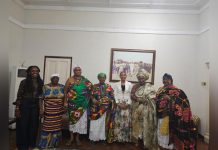Africa-Press – Ghana. It began as another viral moment in Ghana’s ever-busy social media space. A TikTok user made a short clip of a woman arguing with a man in traffic. Within hours, the video had spread widely — reposted on WhatsApp, X, and Facebook. The caption claimed that the woman was a prostitute demanding payment from a client who had refused to pay after their encounter. Thousands laughed, shared, and commented, feeding the frenzy.
But the story was false. The woman in question was not a sex worker. The altercation, it later turned out, had nothing to do with prostitution. The man had accidentally scratched her car, and she had stopped him to demand accountability. The TikToker, in pursuit of views and virality, had added the sensational caption to make the video trend.
Days later, a second video surfaced — this time showing the same woman confronting the content creator and demanding a public apology, threatening legal action. The man, visibly shaken, apologised on camera. But the damage had already been done. In the eyes of thousands who had seen the original clip, the woman’s image was already stained.
The Rise of the Deception Economy
Incidents like this are not isolated. They point to a deeper problem within today’s digital culture — what many now call the deception economy. In this system, attention has become currency. The more reactions, comments, and shares a post attracts, the more it is rewarded by social media algorithms.
The logic is simple but dangerous: The louder the lie, the further it travels. Studies by the Massachusetts Institute of Technology (MIT) have shown that false news spreads about six times faster on social media than factual information. Platforms are built to reward what people react to — not necessarily what is true.
And so, creators learn quickly. Outrage sells. Lies engage. Truth, on the other hand, often moves too quietly to trend.
Casualties of Click Culture
Behind every viral falsehood lies a human story — of someone’s dignity trampled in the rush for digital fame. The young woman in the traffic video may never fully erase the stigma. Similar incidents have ruined careers, marriages, and reputations across the world.
Beyond individuals, the spread of misinformation erodes collective trust. When people begin to doubt everything they see, the line between truth and falsehood blurs. Journalism suffers, institutions lose credibility, and societies drift toward cynicism.
As Dr Peter Rios, a leadership consultant and executive coach, once noted: “Once truth becomes negotiable, everything else is for sale. We start trading honesty for influence, loyalty for lies.”
The Algorithm Problem
At the heart of the matter are the algorithms — invisible systems that decide what each user sees online. These systems are designed to maximise engagement. The more a post makes people react, the more it is shown to others. Outrage, controversy, and shock perform better than calm, reasoned truth.
In this environment, deception becomes a strategy. Some influencers deliberately create fake scenarios to attract attention, only to later dismiss them as “pranks.” Others manipulate news headlines or take videos out of context to ride trending waves. And as long as the clicks keep coming, the platforms reward them with reach — and sometimes, revenue.
But behind every “like” lies a person unconsciously endorsing falsehoods and normalising deception as a way to gain attention. Over time, this culture spills beyond the digital space — into workplaces, churches, and social relationships — where dishonesty becomes acceptable behaviour.
When Laws Lag Behind Technology
While misinformation continues to evolve at lightning speed, Ghana’s legal framework has not kept pace. The country has several laws that touch on false information, but many were crafted in an era when the internet was still emerging — long before TikTok trends, algorithmic promotion, or deepfake technology.
The Electronic Communications Act, 2008 (Act 775), for instance, criminalises the transmission of false or misleading information through electronic means. However, its provisions were developed when digital communication referred largely to emails and early web use — not today’s fast-moving social media environment.
Similarly, sections of the Criminal Offences Act, 1960 (Act 29) address defamation and false publication, but their focus lies largely on traditional media such as print and broadcast. Though the language can cover online content, it was never designed to handle the speed and virality of modern digital disinformation.
The Cybersecurity Act, 2020 (Act 1038) also addresses offences such as cyber fraud, stalking, and bullying. Yet it remains weak in confronting ethical and informational threats like deepfakes and algorithm-driven misinformation.
The Data Protection Act, 2012 (Act 843) safeguards personal information but offers little protection against reputational harm caused by false narratives that spread rapidly online.
Institutionally, similar limitations persist. The National Media Commission monitors journalistic ethics and standards for registered media but has little control over independent digital creators. The National Communications Authority regulates telecom and internet service providers — not content creators or influencers.
Meanwhile, the newly constituted Ministry of Communications, Digital Technology, and Innovation continues to focus largely on infrastructure, connectivity, and ICT policy, leaving the ethical and informational dimensions of the digital ecosystem still weakly addressed.
A Call for Policy Renewal
Ghana needs a modern digital integrity framework — one that reflects today’s information realities. A possible starting point could be a Digital Media Integrity Bill, which clearly defines online misinformation, prescribes penalties for deliberate falsehoods, and establishes transparent accountability mechanisms for content shared on major platforms.
The country could also explore algorithm transparency measures, requiring major social platforms operating locally to disclose how their content recommendation systems work.
Equally important is digital literacy education — empowering young people to verify information before sharing it.
Partnerships with independent fact-checking organisations such as Dubawa, FactSpace West Africa, and Fact-Check Ghana can strengthen oversight, promote public awareness, and encourage ethical digital practices among influencers and content creators through regular trainings and engagements.
Above all, Government agencies must move beyond the traditional radio and television model and engage directly with the fast-moving digital space — where misinformation is born, amplified, and sustained.
The Role of Social Media Companies
While national laws and institutions play their part, global social media platforms themselves — such as TikTok, X (formerly Twitter), Facebook, Instagram, and YouTube — must also take greater responsibility for the digital spaces they have created.
These platforms have made progress. For instance, TikTok now uses AI-driven moderation tools that can flag potentially harmful or hateful content before it is posted. Meta and X also apply content warnings and temporary suspensions for accounts that spread misinformation. Yet, too often, such interventions come after false or harmful content has already gone viral — long after reputations have been damaged and misinformation has spread beyond control.
To be truly effective, content moderation must shift from reaction to prevention. Platforms could enhance their systems to detect and delay the posting of potentially defamatory or manipulated content, pending human review — particularly for trending videos and sensitive topics.
Additionally, these companies can implement graduated penalties for repeat offenders: temporary suspensions, demonetisation of offending accounts, and permanent bans for persistent violators. They can also partner with local fact-checking organisations in Ghana and across Africa to contextualise flagged content in real time, rather than relying solely on automated systems designed for Western contexts.
Most importantly, platforms must be more transparent about how their algorithms amplify or suppress information. If a system rewards outrage and falsehood, then the architecture itself becomes part of the problem. Building safer digital ecosystems means designing algorithms that prioritise accuracy and credibility — not just engagement.
Restoring Information Integrity
Social media was built to connect humans. Yet without responsibility, it can just as easily corrupt humans. In a world where deception is rewarded, choosing truth becomes an act of courage.
Ghana’s future depends not only on protecting free speech but also on protecting truthful speech. Until honesty is valued above virality, the “social” in social media will continue to fade — leaving behind a society less sociable, where many speak but few tell the truth.
Source: Ghana News Agency
For More News And Analysis About Ghana Follow Africa-Press







